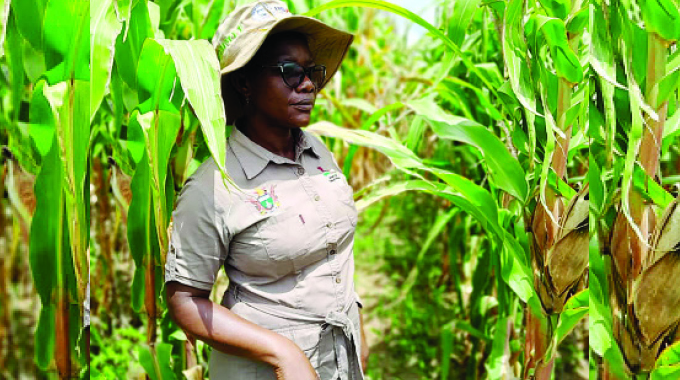Early maize harvests for irrigation scheme farmers

Midlands Bureau
FARMERS at the revitalised Hamamavhaire and Mhende irrigation schemes in Chirumanzu District in Midlands Province have started harvesting their maize crop, which was planted in August.
Hamamavhaire Irrigation Scheme is in Ward 7 under Chief Hama area while Mhende Irrigation Scheme is in Ward 3 under Chief Chirumhanzu area.
The rehabilitation of the Hamamavhaire and Mhende irrigation schemes is being spearheaded by the Agricultural and Rural Development Authority (Arda).
In an interview, Chirumanzu District Agritex officer, Ms Nola Marumbwa said farmers at the two irrigation schemes are now harvesting the maize crop.
“The irrigation scheme (Hamamavhaire) has 103ha which are under irrigation. There are a total of 118 beneficiaries in the irrigation scheme and each farmer has put at least 5ha under irrigation,” she said.
“The crop was planted in August and is ready for harvesting. When they planted the maize crop, they did it for green mealies. When weather experts predicted an El Nino-induced drought, which was likely to affect productivity, farmers decided to keep the maize for grain.”
Ms Marumbwa said the rehabilitation that took place was through the Smallholder Irrigation Revitalisation Programme (SIRP) which saw the irrigation being equipped with three pumps, pipes, stands and sprinklers.
The Government through the SIRP is assisting rural farmers to start projects as part of efforts to boost their income and alleviate poverty in line with the rural industrialisation agenda.
Through rural industrialisation, the Government hopes to stem rural-to-urban migration, which saps growth from the African countryside, transferring it to towns and cities.
Rural industrialisation, which hinges on the Second Republic’s devolution policy, involves nurturing agro-processing start-up enterprises in rural areas through financial and technological support via venture capital funding and Government agencies.
Launched in November 2017, SIRP is a seven-year programme funded by the International Fund for Agricultural Development (IFAD), Opec Fund for International Development (OFID) and the Government, which contributes to the resilience of smallholder farming communities in the country.
The programme assists in the revitalisation of irrigation schemes across the country through the rehabilitation of infrastructure. The SIRP aims to revitalise 6 100 hectares in 152 existing smallholder irrigation schemes in the semi-arid zones of four provinces of Matabeleland South, Manicaland, Masvingo and the Midlands.
“This was done by our Government through the Smallholder Irrigation Revitalisation Programme. The scheme has five wards that surround it and the farmers were equipped with other skills so that they continue to protect their catchment area,” said Ms Marumbwa.
She said farmers at Mhende Irrigation Scheme, which was established in 1974, have put 74ha under irrigation farming.
“It has 434 farmers and uses the canal system of irrigation. During winter they had 44ha of wheat, which they had already sold to GMB. They also had 27ha of green mealies but for the same reason as the Hamamavhaire they ended up reserving the green mealies for grain so that the community is food-secure in light of the looming drought,” said Ms Marumbwa.
Hamamavhaire Irrigation Scheme chairperson Mr Vuchirai Anzelmo commended the Second Republic for rehabilitating the scheme.
“I just want to thank the Second Republic and President Mnangagwa for reviving our irrigation scheme. I can now send my children to school through proceeds from farming,” he said
“Ever since the irrigation scheme was rehabilitated, my life has never been the same again. It’s always good to be self-reliant and feels good to be the master of my destiny thanks to the proceeds from the scheme.”
Midlands Provincial Affairs and Devolution Minister Owen Ncube toured the irrigation schemes this week and commended the farmers for their commitment to boosting food security.











Comments